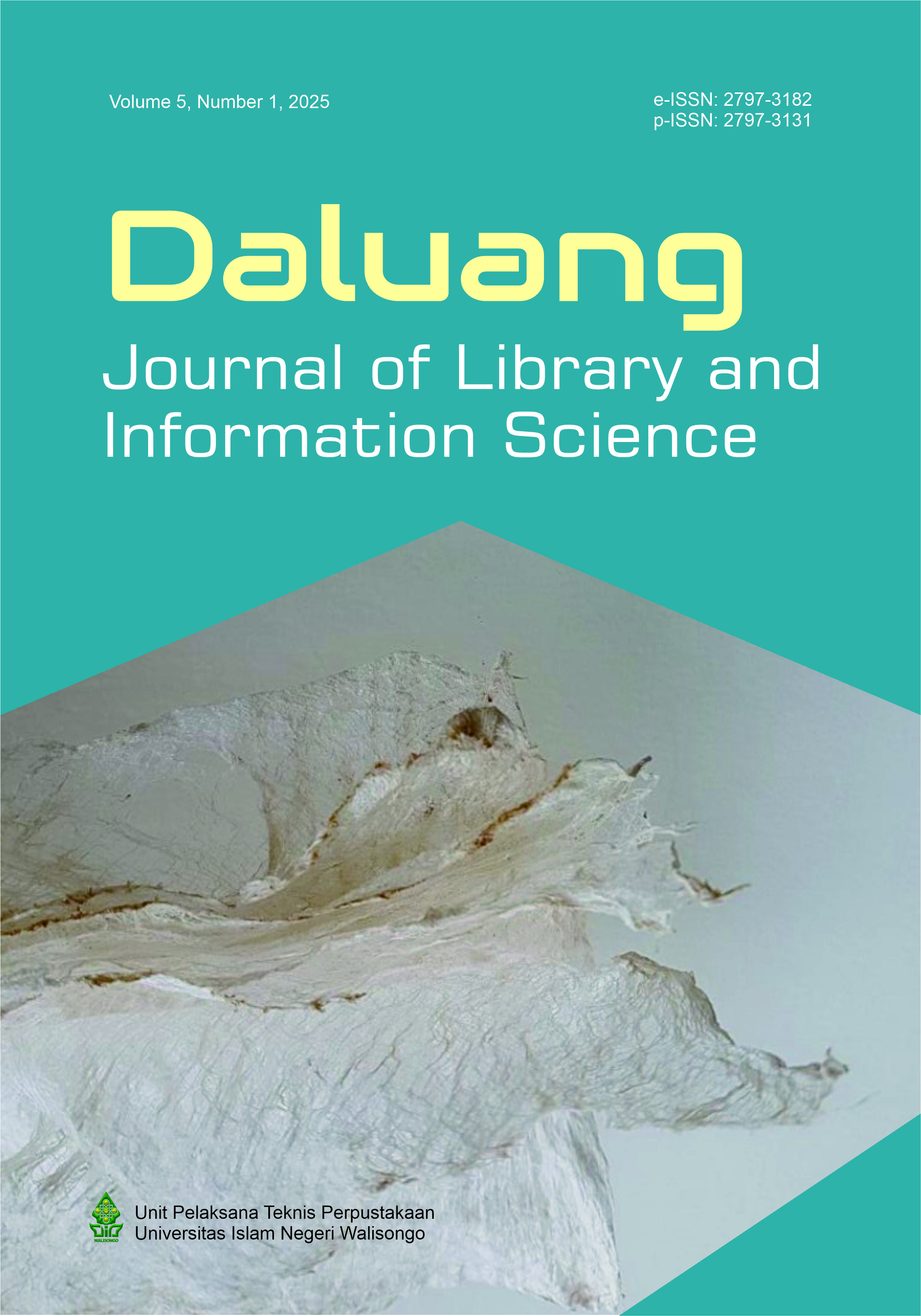Assessing the effectiveness of information literacy integration in secondary school subjects: Perspectives from librarians
Main Article Content
Abstract
Purpose. This study examines the role of school librarians in promoting information literacy in secondary schools within a metropolitan city. It highlights the importance of information literacy, which involves the ability to access, evaluate, and use information effectively.
Methodology. The research, using qualitative interviews with librarians from six selected local government areas, investigates how librarians support teachers and enhance educational outcomes. Key research areas include methods used by librarians to determine teachers' information needs, the extent of consultation with teachers on new acquisitions, how librarians inform teachers about available resources, and the adequacy and usage frequency of library resources.
Results and discussion. The findings reveal varying levels of librarian engagement, with some actively collaborating with teachers and others taking a more passive approach. Challenges identified include time constraints and resource inadequacies.
Conclusions. The study emphasizes the need for better communication and resource management to support information literacy. Despite recognizing its importance, gaps exist in understanding effective librarian practices for empowering teachers and students. Recommendations include fostering librarian-teacher collaboration, updating resource collections, and increasing awareness of available resources to enhance their use in education.
Downloads
Article Details

This work is licensed under a Creative Commons Attribution-NonCommercial-NoDerivatives 4.0 International License.
This work is licensed under a Creative Commons Attribution-NonCommercial-NoDerivatives 4.0 International License.
Articles published in Daluang Journal of Library and information Science are available under Creative Commons Attribution Non-Commercial No Derivatives Licence (CC BY-NC-ND 4.0). Authors retain copyright in their work and grant Daluang Journal of Library and information Science right of first publication under CC BY-NC-ND 4.0. Users have the right to read, download, copy, distribute, print, search, or link to the full texts of articles in this journal, and to use them for any other lawful purpose.
Articles published in Daluang Journal of Library and information Science can be copied, communicated and shared in their published form for non-commercial purposes provided full attribution is given to the author and the journal. Authors are able to enter into separate, additional contractual arrangements for the non-exclusive distribution of the journal's published version of the work (e.g., post it to an institutional repository or publish it in a book), with an acknowledgment of its initial publication in this journal.
This copyright notice applies to articles published in Daluang Journal of Library and information Science volumes 1 onwards.
References
Association of College and Research Libraries. (2015). Framework for information literacy for higher education. http://www.ala.org/acrl/standards/ilframework
Bernard, S. (2024). Investigating curriculum integrated information literacy. The Journal of Academic Librarianship, 50(1), 102839. https://doi.org/10.1016/j.acalib.2023.102839
Bruce, C. (1997). The seven faces of information literacy. Auslib Press.
Chan, F. M. (2021, March). Developing information literacy in the Malaysian smart schools: Resource-based learning as a tool to prepare today's students for tomorrow's society. In IASL annual conference proceedings (pp. 203–216). https://journals.library.ualberta.ca/slw/index.php/iasl/article/view/8079
Chowdhury, M. R., & Khan, N. A. (2024). Facilitating knowledge creation: A case study of academic development at Noakhali Science and Technology University Library. International Research Journal of Library and Information Studies, 12(1), 50–64. https://doi.org/10.5281/zenodo.10635434
Chu, S. K. W. (2012). Assessing information literacy: A case study of Hong Kong secondary students. School Libraries Worldwide, 18(1), 100–113. https://eric.ed.gov/?id=EJ994324
De Jesus, D. A., Tubis, R. R., Leoncio, K. M., & De Guzman, R. F. (2024). Investigating the role of libraries in fostering information literacy: A qualitative study on user perspectives and educational impact. Ignatian International Journal for Multidisciplinary Research, 2(1). https://doi.org/10.5281/zenodo.10580020
Durodolu, O. O. (2018). Secondary school teachers' perceptions of information literacy skills. Mousaion: South African Journal of Information Studies, 36(1). https://doi.org/10.25159/0027-2639/3873
Durodolu, O. O., Nduka, S. C., & Tinyiko, T. V. (2022). Media literacy and fake news: Evaluating the roles and responsibilities of radio stations in combating fake news in the COVID-19 era. International Journal of Information Sciences Management, 6(1), 32–49. https://www.ijims.org/index.php/home/article/view/53/60
Guo, J., & Huang, J. (2021). Information literacy education during the pandemic: The cases of academic libraries in Chinese top universities. The Journal of Academic Librarianship, 47(4), 102363. https://doi.org/10.1016/j.acalib.2021.102363
Julien, H. (2016). Beyond the hyperbole: Information literacy realities. Communications in Information Literacy, 10(2), 124–131. https://files.eric.ed.gov/fulltext/EJ1125443.pdf
Katz, D., & Kahn, R. L. (1978). The social psychology of organizations (Vol. 2). Wiley. https://www.taylorfrancis.com/chapters/edit/10.4324/9781315702001-12/social-psychology-organizations-daniel-katz-robert-kahn
Lloyd, A. (2017). Researching fractured (information) landscapes: Implications for library and information science researchers. Library & Information Science Research, 39(2), 98–104. https://www.emerald.com/jd/article-abstract/73/1/35/199580/Researching-fractured-information?redirectedFrom=fulltext
Lo, L. S. (2023). The clear path: A framework for enhancing information literacy through prompt engineering. The Journal of Academic Librarianship, 49(4), 102720. https://doi.org/10.1016/j.acalib.2023.102720
Merga, M. K. (2020). School librarians as literacy educators within a complex role. Journal of Library Administration, 60(8), 889-908. https://doi.org/10.1080/01930826.2020.1820278
Mishra, P., & Koehler, M. J. (2006). Technological pedagogical content knowledge: A framework for teacher knowledge. Teachers College Record, 108(6), 1017–1054. https://doi.org/10.1111/j.1467-9620.2006.00684.x
Montiel-Overall, P. (2005). A theoretical understanding of teacher and librarian collaboration (TLC). School Libraries Worldwide, 11(2), 24–48. https://journals.library.ualberta.ca/slw/index.php/slw/article/view/6962
Paul, M., Deja, M., Kisilowska-Szurmińska, M., Głowacka, E., Świgoń, M., & Wojciechowska, M. (2024). Understanding information literacy among doctoral students: An ILDoc model and assessment tool. The Journal of Academic Librarianship, 50(2), 102855. https://doi.org/10.1016/j.acalib.2024.102855
Saryanto, S., Saadillah, A., Mutmainnah, M., Mahendika, D., & Astuti, E. D. (2023). The analysis of lecturers' information literacy skill to support competence in teaching learning activities. Journal on Education, 5(4), 10754–10762. https://jonedu.org/index.php/joe/article/view/1987
Tewell, E. (2015). A decade of information literacy: A review of the literature. Communications in Information Literacy, 9(1), 17–37. https://files.eric.ed.gov/fulltext/EJ1089135.pdf
Trebbe, G. (2015). Information literacy as a value: New perspective for developing a secondary education library program. https://repository.library.northeastern.edu/files/neu:cj82m221v/fulltext.pdf



